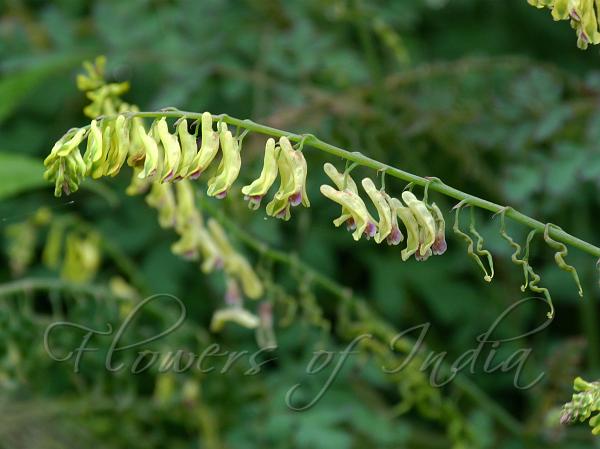|
| Snake Pod Corydalis |
|

|

| File size | 387708 |
| Original date | 6/25/11 10:14 AM |
| Resolution | 2048 x 1536 |
| Flash | Flash did not fire, auto |
| Focal length | 61.0mm |
| Exposure time | 1/200s |
| Aperture | 4.1 |
| Focus Distance | |
| Metering Mode | Multi-segment |
| Camera make | Panasonic |
| Camera model | DMC-FZ40 |
| Sensor type | OneChipColorArea |
|
|
|
|
Photo: |
Botanical name: Corydalis ophiocarpa Family: Papaveraceae (Poppy family)
Synonyms: Capnoides ophiocarpa, Corydalis japonica
Synonyms: Capnoides ophiocarpa, Corydalis japonica
Snake Pod Corydalis is a Corydalis from eastern
Himalayas. It is so named because the seed-pods look like little green
eels or serpents. It is a biennial (rarely annual) herb with few to
several, erect stems, 40-100 cm tall, sometimes very thick, especially
at base, conspicuously winged-ridged, leafy, branched. Basal leaves are
many, 10-50 cm; stalk equal to blade, winged, especially broadly so
toward base. Leaf blade is oblong, double-compound, primary pinnae 4-6
pairs, secondary pinnules 2(or 3) pairs, obovate to oblong, entire to
3-5-lobed; segments 3-10 × 1-5 mm, tip blunt to rarely pointed. Lower
stem leaves are like basal leaves, upper ones smaller and much more
shortly stalked. Flowers are borne in 20-40-flowered spikelike racemes,
10-30 cm long, (or fewer flowered in lateral racemes). Bracts are
linear-lanceshaped, 2-5 mm. Flowers are pale yellow to whitish, usually
dark tipped, 1.1-1.2 cm, carried on 5-7 mm long stalks. Outer petals
are blunt; spur ascending, broadly sac-like, about 3 mm. Nectary is
extended through about half of spur. Inner petals are 8-10 mm, tipped
with dark purple, with crest clearly extending beyond tip, claw shorter
than limb. Capsule are reflexed, linear, strongly contorted, 2-3 cm ×
about 1.5 mm. Snake Pod Corydalis is found in eastern Himalayas,
Bhutan, Sikkim, China, at altitudes of 1100-4000 m. Flowering:
May-August.
| Identification credit: Magnus Lidén | Photographed in Lachung, Sikkim. |
• Is this flower misidentified? If yes,